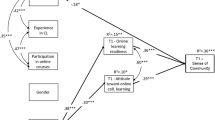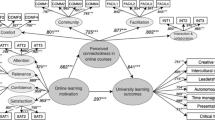Abstract
This study aims to investigate the role of harmonious classroom environment to promote student’s sense of belonging and engagement in online learning. Harmonious classroom environment is addressed with student–teacher relationship and student–student relationship, while student engagement comprises three interrelated components of cognitive, affective and behavioral engagement. In this paper, respondents are recruited from Tencent classroom. Three hundred and five valid data are obtained to analyze by structural equation model. The results reveal that harmonious relationships positively predict student’s sense of belonging and engagement in online learning. Furthermore, sense of belonging is a mediator between harmonious relationships and student engagement. Accordingly, it seems important for online learning platform to establish positive student–teacher relationship and student–student relationship for motivating students to engage in learning activities.


Similar content being viewed by others
References
Anderson, J. C., & Gerbing, D. W. (1988). Structural equation modeling in practice: A review and recommended two-step approach. Psychological Bulletin, 103, 411–423.
Appleton, J. J., Christenson, S. L., Kim, D., & Reschly, A. L. (2006). Measuring cognitive and psychological engagement: Validation of the student engagement instrument. Journal of School Psychology, 44(5), 427–445.
Bagozzi, R. P., & Yi, Y. (1988). On the evaluation of structural equation models. Journal of the Academy of Marketing Science, 16(1), 74–94.
Baron, R. M., & Kenny, D. A. (1986). The moderator mediator variable distinction in social psychological-research—Conceptual, strategic, and statistical considerations. Journal of Personality and Social Psychology, 51, 1173–1182.
Bentler, P. M., & Bonett, D. G. (1980). Significance tests and goodness of fit in the analysis of covariance structures. Psychological Bulletin, 88(3), 588–606.
Bernard, R. M., Abrami, P. C., Borokhovski, E., Wade, C. A., Tamim, R., Surkes, M. A., & Bethel, E. C. (2009). A meta-analysis of three types of interaction treatments in distance education. Review of Educational Research, 79(3), 1243–1289.
Christie, H., & Morris, N. (2019). Using assessed blogs to enhance student engagement. Teaching in Higher Education, 26(4), 1–13.
Coleman, J. S. (1988). Social capital in the creation of human capital. American Journal of Sociology, 94, S95–S120.
Daniels, L. M., Adams, C., & McCaffrey, A. (2016). Emotional and social engagement in a massive open online course: An examination of Dino 101. Emotions, technology, and learning (pp. 25–41). Academic Press.
Datu, J. A. D. (2018). Flourishing is associated with higher academic achievement and engagement in Filipino undergraduate and high school students. Journal of Happiness Studies, 19(1), 27–39.
Davis, K., Sridharan, H., Koepke, L., Singh, S., & Boiko, R. (2018). Learning and engagement in a gamified course: Investigating the effects of student characteristics. Journal of Computer Assisted Learning, 34(5), 492–503.
Dennie, D., Acharya, P., Greer, D., & Bryant, C. (2019). The impact of teacher–student relationships and classroom engagement on student growth percentiles of 7th and 8th grade students. Psychology in the Schools, 56(5), 765–780.
Ding, L., Er, E., & Orey, M. (2018). An exploratory study of student engagement in gamified online discussions. Computers & Education, 120, 213–226.
Doucet, L., Shao, B., Wang, L., & Oldham, G. R. (2016). I know how you feel, but it does not always help: Integrating emotion recognition, agreeableness, and cognitive ability in a compensatory model of service performance. Journal of Service Management, 27(3), 320–338.
Dunn, T. J., & Kennedy, M. (2019). Technology enhanced learning in higher education; motivations, engagement and academic achievement. Computers & Education, 137(8), 104–113.
Flynn, D. (2014). Baccalaureate attainment of college students at 4-year institutions as a function of student engagement behaviors: Social and academic student engagement behaviors matter. Research in Higher Education, 55(5), 467–493.
Fornell, C., & Larcker, D. F. (1981). Evaluating structural equation models with unobservable and measuremenr error. Journal of Marketing Research, 34(2), 161–188.
Fredricks, J. A., Blumenfeld, P. C., & Paris, A. H. (2004). School engagement: Potential of the concept, state of the evidence. Review of Educational Research, 74(1), 59–109.
Gigliotti, R. A. (2016). Institutional identification and sense of community: Analysis of a new online graduate public administration program. Journal of Public Affairs Education, 22(3), 399–414.
Gillenoneel, C. (2019). Sense of belonging and student engagement: A daily study of first- and continuing-generation college students. Research in Higher Education. https://doi.org/10.1007/s11162-019-09570-y
Hair, J. F., Black, W. C., Babin, B. J., Anderson, R. E., & Tatham, R. L. (2006). Multivariate data analysis (Vol. 6). Pearson Prentice Hall.
Heflin, H., Shewmaker, J., & Nguyen, J. (2017). Impact of mobile technology on student attitudes, engagement, and learning. Computers & Education, 107(4), 91–99.
Kim, M. K., & Kim, S. M. (2020). Dynamic learner engagement in a wiki-enhanced writing course. Journal of Computing in Higher Education, 32, 1–25.
Klassen, R. M., Yerdelen, S., & Durksen, T. L. (2013). Measuring teacher engagement: development of the engaged teachers scale (ETS). Frontline Learning Research, 1(2), 33–52.
Lashari, T. A., Alias, M., Kesot, M. J., & Akasah, Z. A. (2012). The effect of integrated affective-cognitive learning approach on classroom behavioral engagement of engineering students. Academy of Management Learning & Education.
Law, K. M. Y., Geng, S., & Li, T. (2019). Student enrollment, motivation and learning performance in a blended learning environment: The mediating effects of social, teaching, and cognitive presence. Computers & Education, 136(7), 1–12.
Levenson, R. W., Carstensen, L. L., & Gottman, J. M. (1994). Influence of age and gender on affect, physiology, and their interrelations: A study of long-term marriages. Journal of Personality and Social Psychology, 67(1), 56.
Lin, F., Wang, T. Y., & Yang, K. (2018). Description and evaluation of a large-scale project to facilitate student engagement in learning mathematics. Studies in Educational Evaluation, 58, 178–186.
Luo, C., Luo, X. R., & Bose, R. (2018). Information usefulness in online third party forums. Computers in Human Behavior, 85, 61–73.
Luo, N., Zhang, Y., & Zhang, M. (2019). Retaining learners by establishing harmonious relationships in e-learning environment. Interactive Learning Environments, 27(1), 118–131.
Macleod, J., Yang, H. H., & Shi, Y. (2019). Student-to-student connectedness in higher education: A systematic literature review. Journal of Computing in Higher Education, 31(2), 426–448.
Masika, R., & Jones, J. (2016). Building student belonging and engagement: Insights into higher education students’ experiences of participating and learning together. Teaching in Higher Education, 21(2), 138–150.
Ooi, K. B., Hew, J. J., & Lee, V. H. (2018). Could the mobile and social perspectives of mobile social learning platforms motivate learners to learn continuously? Computers & Education, 120(5), 127–145.
Panigrahi, R., Srivastava, P. R., & Sharma, D. (2018). Online learning: Adoption, continuance, and learning outcome—A review of literature. International Journal of Information Management, 43(12), 1–14.
Preacher, K., & Hayes, A. F. (2008). Asymptotic and resampling strategies for assessing and comparing indirect effects in multiple mediator models. Behavior Research Methods, 40(3), 879–891.
Quin, D., Hemphill, S. A., & Heerde, J. A. (2017). Associations between teaching quality and secondary students’ behavioral, emotional, and cognitive engagement in school. Social Psychology of Education, 20(4), 807–829.
Reeve, J., & Tseng, C. (2011). Agency as a fourth aspect of students’ engagement during learning activities. Contemporary Educational Psychology, 36(4), 257–267.
Reyes, M. R., Brackett, M. A., Rivers, S. E., White, M., & Salovey, P. (2012). Classroom emotional climate, student engagement, and academic achievement. Journal of Educational Psychology, 104(3), 700–712.
Rushton, S., Giallo, R., & Efron, D. (2019). ADHD and emotional engagement with school in the primary years: Investigating the role of student–teacher relationships. British Journal of Educational Psychology. https://doi.org/10.1111/bjep.12316
Sinatra, G. M., Heddy, B. C., & Lombardi, D. (2015). The challenges of defining and measuring student engagement in science. Educational Psychologist, 50(1), 1–13.
Tas, Y., Subasi, M., & Yerdelen, S. (2019). The role of motivation between perceived teacher support and student engagement in science class. Educational Studies, 45(5), 582–592.
Wonglorsaichon, B., Wongwanich, S., & Wiratchai, N. (2014). The Influence of students school engagement on learning achievement: A structural equation modeling analysis. Procedia - Social and Behavioral Sciences, 116, 1748–1755.
Zhoc, K. C., Webster, B. J., King, R. B., Li, J. C., & Chung, T. S. (2019). Higher education student engagement scale (HESES): Development and psychometric evidence. Research in Higher Education, 60(2), 219–244.
Acknowledgements
The authors gratefully acknowledge the support of Teaching Reform Project of Beijing Information Science and Technology University (Grant Nos. 2020JGYB24, 2020JGYB23), Social Science Program of Beijing Municipal Education Commission (Grant No. SM202011232002), Beijing Social Science Fund (Grant No. 19GLC068), and Project of Beijing Information Science and Technology University to Improve Connotation Development and Scientific Research Level (Grant No. 2020KYNH218) and the useful suggestions by the editors and reviewers.
Author information
Authors and Affiliations
Corresponding author
Additional information
Publisher's Note
Springer Nature remains neutral with regard to jurisdictional claims in published maps and institutional affiliations.
Rights and permissions
About this article
Cite this article
Luo, N., Li, H., Zhao, L. et al. Promoting Student Engagement in Online Learning Through Harmonious Classroom Environment. Asia-Pacific Edu Res 31, 541–551 (2022). https://doi.org/10.1007/s40299-021-00606-5
Accepted:
Published:
Issue Date:
DOI: https://doi.org/10.1007/s40299-021-00606-5




